Renal Failure in Liver Disease, Symptoms, Causes, Diagnose, Treatment
Renal Failure in Liver Disease
Renal failure is a condition where the kidneys are unable to properly filter waste products and excess fluids from the blood. This can occur as a complication of liver disease and is known as Hepatorenal Syndrome (HRS).
HRS is most commonly associated with advanced liver cirrhosis, which is a condition where the liver becomes damaged and scarred.
This disease can be prevented by managing the underlying liver disease and reducing the risk of complications. This includes avoiding alcohol consumption and maintaining a healthy diet, as well as monitoring liver function and seeking prompt medical attention for any symptoms of liver disease.

Symptoms of Renal Failure in Liver Disease
The symptoms of HRS can be vague and may include
- decreased urine output,
- swelling in the legs and abdomen
- confusion or altered mental state.
These symptoms can be similar to those of other liver disease complications, such as ascites or hepatic encephalopathy, making diagnosis challenging.
Causes of Renal Failure in Liver Disease
In liver cirrhosis, blood flow to the kidneys can become restricted, leading to decreased kidney function. Additionally, the buildup of toxins in the body that occurs in liver disease can also contribute to HRS.
The exact cause of HRS is not fully understood, but it is thought to be related to changes in the hormones that regulate blood flow to the kidneys.
Diagnose of Renal Failure in Liver Disease
Doctors will typically perform blood tests to assess kidney function and evaluate for other possible causes of kidney damage, such as infection or medication toxicity. Imaging studies, such as ultrasound or CT scans, may also be used to evaluate the liver and kidneys.
Treatment for Renal Failure in Liver Disease
The treatment for this disease involves managing the underlying liver disease and improving kidney function. This may include medications to improve blood flow to the kidneys and reduce fluid buildup.
These medications are typically given in a hospital setting. In some cases, liver transplantation may be necessary to handle the underlying liver disease and improve kidney function.
Dr. Amit Agarwal
Director & Gastroenterologist Consultant
Agarwal Gastrocare Center Indore



